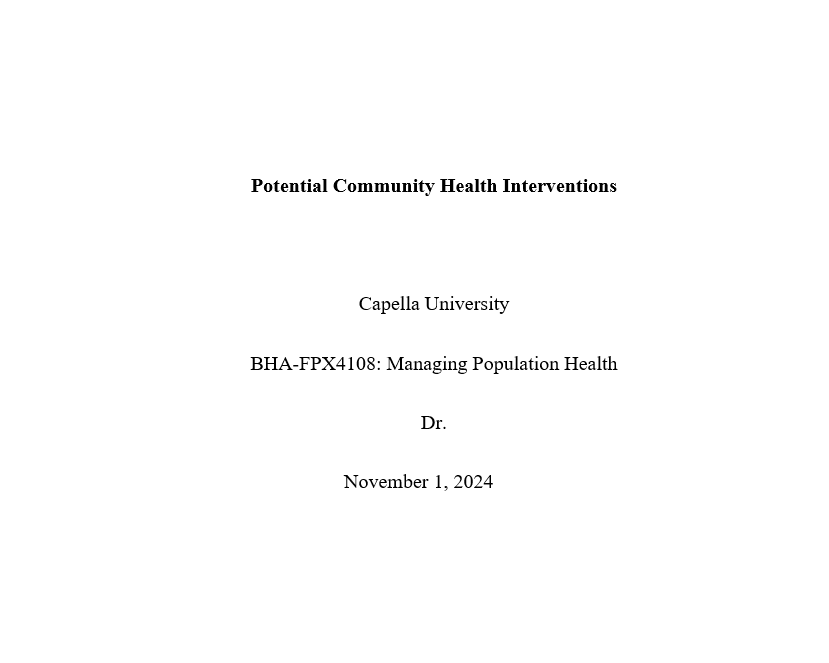Capella University
BHA-FPX4108: Managing Population Health
Dr.
November 1, 2024
Potential Community Health Interventions
Evidence-based solutions help address individual and population health needs. Stakeholders learn to utilize treatment and prevention models that match health issues across a community. A health issue that requires a renewed commitment to designing and implementing viable solutions is diabetes. The problem associated with rising blood glucose levels reinforces the need for self-management practices to prevent symptoms from escalating to severe levels. Patients can choose their preferred approach for controlling and managing diabetes symptoms. One intervention is intensive insulin therapy which entails a commitment to restore normal insulin secretion.
Using intravenous insulin enables individuals to meet target blood glucose levels with regular testing and adjustment of doses to overcome the risk of undesirable progression. Similarly, self-care management is a viable option for patients to take charge of their health and well-being. The intervention encourages patients to adopt healthy eating, risk-reduction behaviors such as smoking cessation, and physical activities necessary to maintain healthy blood glucose levels. This paper discusses the social determinants of health in the Bronx and the implications of intensive insulin therapy and self-care on patients’ health and well-being.
The Impacts of Social Determinants of Health
The Bronx is among the places with a high number of fast-food restaurants. One is likely to find a place to eat because there is always a restaurant or at least a fast food place they can order from within the community. The situation exposes residents to being overweight and having diabetes. Notably, diabetes in the Bronx is escalating considering one in three people suffer from diabetes. The region is among the places with the highest rates of diabetes (Thorpe et al., 2018).
The most affected populations are low-income and minority groups. The populations have challenges such as limited access to adequate and quality healthcare, which expose them to negative health-seeking behaviors. Hispanics and Blacks are the most affected due to constrained access to screening, diagnosis, prevention, and treatment services (Thorpe et al., 2018). The low-income groups are likely to purchase unhealthy foods since it is more costly to afford vegetables and fruits than it is to buy fast food. This situation makes diabetes a common disease and a leading cause of death among adults.
Social determinants of health help identify vulnerable and under-resourced households. The determinants such as income and education help stakeholders to assess the implications of health disparities on diabetes burden across the community. Accurate and adequate data on risks such as physical inactivity, unhealthy diet, and poor blood glucose level monitoring provides insights into the determinants of health and appropriate solutions (Rural Health Information Hub, 2022).
The data guides policymakers, healthcare providers, and other stakeholders to design tailored approaches, including culturally and linguistically appropriate services to enhance diabetes self-management awareness. For instance, there are opportunities to organize educational sessions in community meetings to make residents aware of risks, symptoms, and effective diabetes management practices.
The audience benefits from accessible advice provided by qualified diabetes educators and other professionals. Thus, social determinants of health make more people aware of the situation in the community and the opportunity available to improve their quality of life. Social determinants of health influence individuals’ ability to manage diabetes and prevent severe and costly complications. Stakeholders such as the public health department also enhance surveillance, understand community needs, and initiate evidence-based plans for improving individual and population health.
Evidence-Based Treatment Model
Diabetes is a chronic condition that jeopardizes one’s health and productivity. The leading causes of uncontrolled diabetes or new cases are poverty, low education levels, limited access to care, and challenges accessing healthy food. Uncontrolled symptoms increase the cost of care, hence the need for patient-centered and evidence-based care to safeguard individuals from the adverse impacts of the seventh leading cause of death in the United States (Wadden et al., 2019).
Timely response reduces the risk of heart disease, kidney failure, and toe amputations. Intensive insulin therapy is a viable option for individuals living with diabetes. The method is appropriate for controlling glucose levels and reducing the risk of severe complications in the long term (Wadden et al., 2019). The right commitment and good level of understanding of the condition and symptoms enable individuals to benefit from regular shots of insulin and frequent testing.
The goal is to maintain control within the recommended blood glucose levels guidelines. The intervention is achievable through multiple injections per day, regular testing, and frequent consultations with qualified healthcare professionals. Intensive insulin therapy is appropriate for individuals who understand the procedure and are confident adjusting their insulin doses (Wadden et al., 2019). Equally, beneficiaries should willingly take multiple injections of insulin a day or use insulin pumps to achieve the intended outcomes. Patients should consult to access accurate and complete information on the effective use of intensive insulin therapy to prevent and slow the progression of long-term diabetes complications.
Evidence-Based Wellness Model
The best approach for managing diabetes is taking proactive steps to lower blood sugar, blood pressure, and cholesterol. The process also entails embracing tobacco use cessation. Patients should engage a qualified healthcare professional to discuss a plan that matches the determinants of health and is likely to produce optimal results. Self-care is an essential component of evidence-based diabetes management (Rural Health Information Hub, 2022). The option allows patients to embrace behaviors such as compliance with medications, effective problem-solving skills, and risk-reduction practices.
Self-management model is appropriate for preventing adverse outcomes associated with escalating diabetes symptoms (Rural Health Information Hub, 2022). The evidence-based approach guides individuals on activities and behaviors for controlling and treating diabetes. The model reminds patients to monitor their health regularly from their homes. Self-care management provides a comprehensive framework for maintaining a healthy diet, engaging in regular physical activities, adhering to medications as recommended, and monitoring other signs associated with diabetes.
People with diabetes and vulnerable population access education and social support to embrace behaviors that help lower blood sugar levels, prevent complications and improve quality of life. Self-management also strengthens patient and family engagement and education. The groups access emotional support, advice, and other services necessary to enhance self-efficacy for diabetes self-management (Rural Health Information Hub, 2022). Thus, patients, families, and vulnerable groups should participate in health promotion and education designed to address diabetes. Peer facilitators or diabetes educators deliver lessons on a diet, exercises, and medications. The audience also accesses information on the mental and emotional aspects of diabetes and the best ways to access primary care providers and specialists.
Conclusion
Diabetes exposes patients, families, and communities to adverse social and economic impacts. Evidence-based solutions include self-care management and intensive insulin therapy that enable individuals to monitor and control blood glucose levels. The practices require a commitment to promote medication adherence, lifestyle modifications, and self-testing of glucose levels to avoid undesirable disease progression. Increased awareness about risk factors and evidence-based management helps patients, families, and communities reduce the social and economic burden associated with diabetes and related complications.
References
CDC. (2022). Social media. U.S. Department of Health & Human Services. https://www.cdc.gov/diabetes/library/socialmedia/index.html
Furman Center for Real Estate and Urban Policy. (2022). The Bronx. Furman Center for Real Estate and Urban Policy. https://furmancenter.org/neighborhoods/view/the-bronx
Rural Health Information Hub. (2022). Self-management model. Rural Health Information Hub. https://www.ruralhealthinfo.org/toolkits/diabetes/2/self-management
Thorpe, L., Kanchi, R., Chamany, S., Chernov, C., Perlman, S., Freeman, A., & Rodriguez-Lopez, J. (2018). Change in diabetes prevalence and control among New York City adults: NYC Health and Nutrition Examination Surveys 2004–2014. Journal of Urban Health, 95, 826-831. https://www.ncbi.nlm.nih.gov/pmc/articles/PMC6286282/pdf/11524_2018_Article_285.pdf
Wadden, T., Walsh, O., Berkowitz, R., Chao, A., Alamuddin, N., Gruber, K., Leonard, S., Mugler, K., & Tronieri, J. S. (2019). Intensive behavioral therapy for obesity combined with Liraglutide 3.0 mg: A randomized controlled trial. Obesity, 27(1), 75-86. https://www.ncbi.nlm.nih.gov/pmc/articles/PMC6800068/pdf/nihms-1053477.pdf

